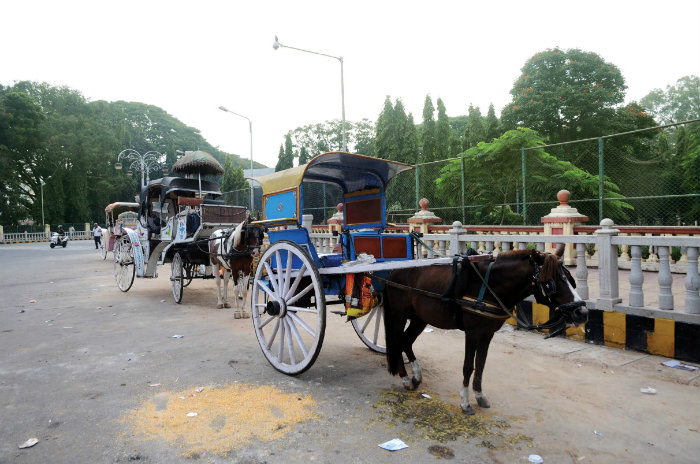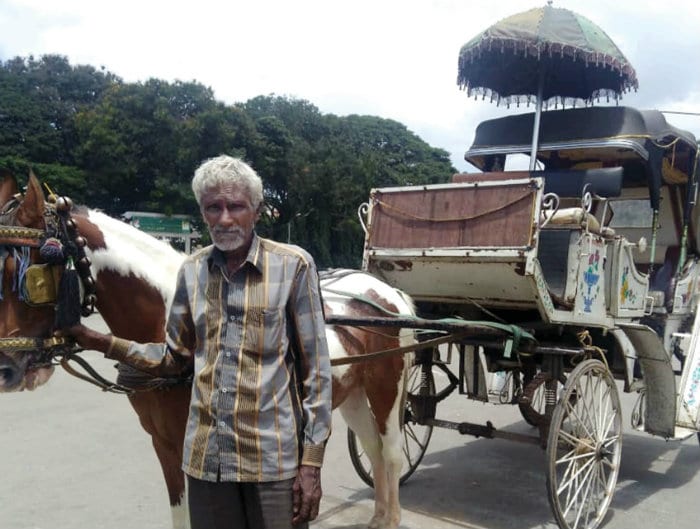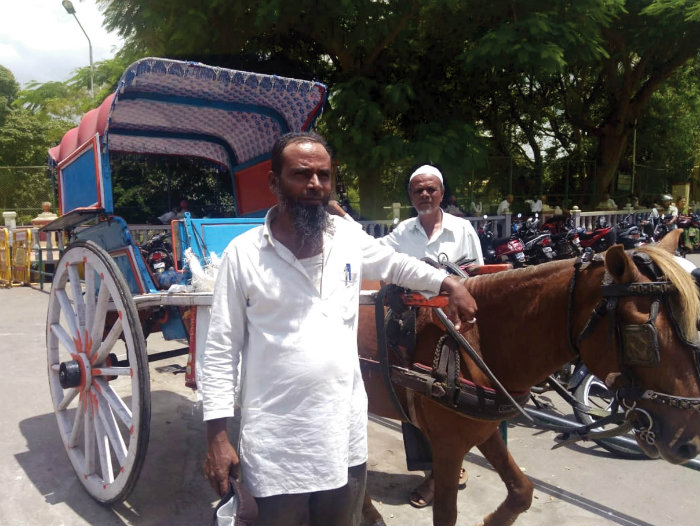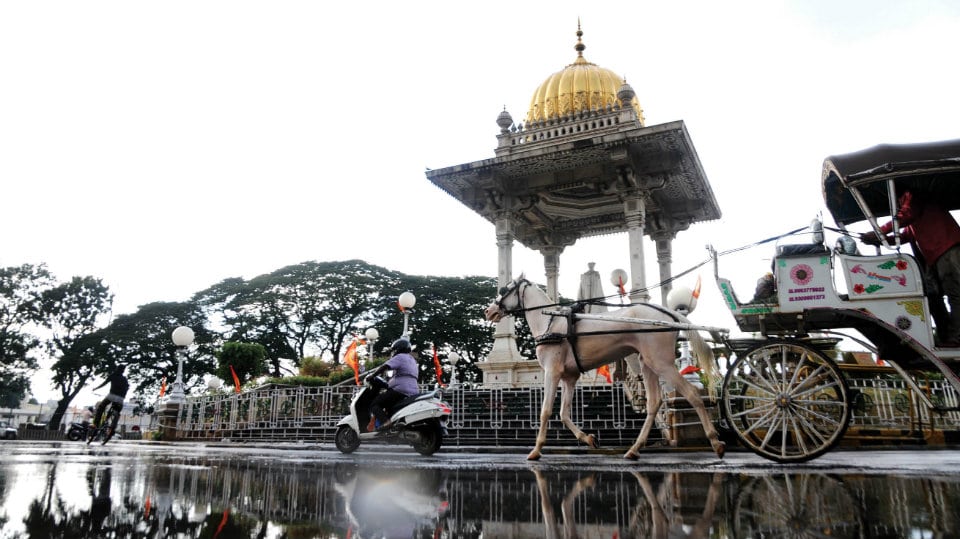By M.B. Pavan Kumar
Koi Haseena Jab Rooth Jaati Hai’ is one of the famous songs in that 1975 blockbuster movie Sholay, with Basanti (Hema Malini), the tongewali and Veeru (Dharmendra), the ex-convict trying to woo her. But Mysuru has always been known for its tongas and the old Mysureans have been familiar with ‘tak..tak..tak..’ — the hoof sounds of the horse-drawn tongas.
In fact, in the early part of the twentieth century, there were hardly any vehicles on the road and one could count the number of cars and scooters on one’s finger tips. But the tongas were there in plenty even till the late 1970s.
The tonga, it is said, entered Mysuru around 1897 and it was the main form of transport for Mysureans. Even for the kings, it was a major attraction and they also used it to move from one place to another at times.
Every Mysurean remembers tonga with affection and awe and the experience of climbing into it, keeping one foot on the support and then stepping on to the platform and sitting in the back seat. (Incidentally, it is very confusing to describe this as what is front becomes the back seat because the tongawala drives the horse sitting in the front. But the passengers sitting facing his back also have the view of the road in the front!). Some tongas had soft cushions and some hard ones. The children would invariably be picked up by the tongawala and made to sit in the front.
He would ask the elders sitting at the back to move a bit back in order for the tonga to get a balance. But all these experiences have now remained a memory. With the advent of technology, the mean machines started occupying the space in the city and the tongas slowly started fading.

Tongas parked near Mysore Palace.
Now, tongas are just a form of entertainment to travel in. However, in the cultural, heritage city of Mysuru, their presence still exists. They are mainly stationed near Mysore Palace, Agrahara Circle, Zoo, St. Philomena’s Church and surrounding areas.
The tourists love to go around the Palace and other attractions sitting in tongas.
There are many tongawalas who have maintained the tradition of running the tongas, as a profession even to this day. But, sadly, their lot has not improved at all. There are no proper facilities provided to them.
The City Corporation (earlier Municipal Corporation) was granting licence to operate the tongas in city. Each tonga was even given a number just like for other vehicles now and the tongawalas were given badges. If the tongas did not have a lamp and bell, the Police would impose fines on the tongawalas. The Police would also keep a watch on the health of the horses, said tongawala Mohammad Ghouse, 79, recalling the glory days of the tongas.
Ghouse entered the profession at a very young age of 17. He was born and brought up in Sunnadakeri (near Siddappa Square where there was a tonga stand). Now, he lives in Shantinagar, he said.

Tongawala Mohammad Ghouse with Sarot tonga.
‘Shah Pasand’
The then Mysuru ruler Rajarshi Nalwadi Krishnaraja Wadiyar, who had seen the beautifully designed tonga, had sat on it and said, “It is very lovely.” In the light of this, the tongas designed very expansively, were called ‘Shah Pasand,’ said Shah Pasand Tonga Association President Faiaz Ahmed.
He further elaborates and says that because the Maharaja said that it was a beautiful experience, the tongas were called Shah Pasand, which are Hindi and Urdu words, as recounted to him by his elders. There are two types of tongas. One is the Shah Pasand with two wheels, drawn by a horse and the other is called ‘Sarot’ which is elaborately designed having four wheels. This is called ‘Buggy’ in Hindi and Urdu, he said.
Tourists, locals support us…
Along with the tourists, even Mysureans have supported us. Many of the locals come in cars, park them and take a tonga ride. Hence, the people, who depend on tongas for their livelihood, can carry on with their life, said Faiyaz Ahmed.
The ‘sarot’ has the capacity to hold six to seven people and for a tonga ride around the Palace, Rs.50 per person is charged. Similarly, Shah Pasand can seat four to five persons and Rs.50 is fixed per person for a ride around the Palace, he said.

Faiz Ahmed seen with a tonga.
Give permission to enter Palace at least this Dasara….
Every Dasara, tongas were being allowed into the Palace. The tongawalas were wearing turbans and dresses, reflecting the tradition of the Maharajas. For this, the tongawalas were given Rs.100 honorarium per day. When Shobha Karandlaje was the District in-Charge Minister, she had got the tongas painted and also got them Rs.2,000 honorarium. However, during the previous Congress rule, the tongas were banned inside the Palace. Hence, at least during this Dasara, Chief Minister H.D. Kumaraswamy and Mysuru District in-Charge Minister G.T. Devegowda must take action to allow us inside the Palace.
There are nearly 150 tongas in Mysuru and more than twice the number ride the tongas. About three to four years ago, under NURM scheme, Sarot tongas were distributed. Under this scheme, a few more tongas have not been given. Along with this, proper facilities must be provided.
– Faiz Ahmed, President, Shah Pasand Tonga Association
Tradition continues…
My father Imam Sab also was a tongawala. I learnt the art of riding tongas from him. Now, I have taken on contract an owner’s tonga. 25 percent of the earnings belong to me, as the rest I have to give to the owner. – Mohammad Ghouse
After I became the Commissioner of Mysuru City Corporation (MCC), none have brought to my notice about distributing Sarot tonga. Only now this issue has been discussed. In 2014, 11 sarots were given under NURM scheme. At that time the requirement of 11 tongas were met by getting them from Punjab. Now, the NURM scheme has ended and we have to find some other head and try to fulfil the demand as also provide basic facilities to the tongawalas. -K.H. Jagadeesha, MCC Commissioner








Autos killed tongas. Tongawallahs were mainly Muslims, with a few wives and many children, hence had a very large family to feed. Their family had to make a living. which meant demanding a high fee to carry passengers say from the Mysore railway station. One could see customers with luggage at the railway station haggling with tongawallahs, and often this used to be an exasperating exercise as the tongawallahs refused to receive the agreed fee at the destination resulting in quite loud disagreements, and sometimes needing intervention by the police. The poor horse which drew the tonga was often malnourished, and we had seen the sights of the poor animal down to the ground in Sayyaji Rao Road with not much strength left to get up and pull the cart with passengers. These tongas could only be show cases today.
Good infrastructure with autos, affordable bikes and cars have killed the tongas. I personally haven’t seen any tongawallah brother with many wives, please don’t speculate and spread lies.
We have in 1950s and 1960s. It is that you do not like the truth to be told.